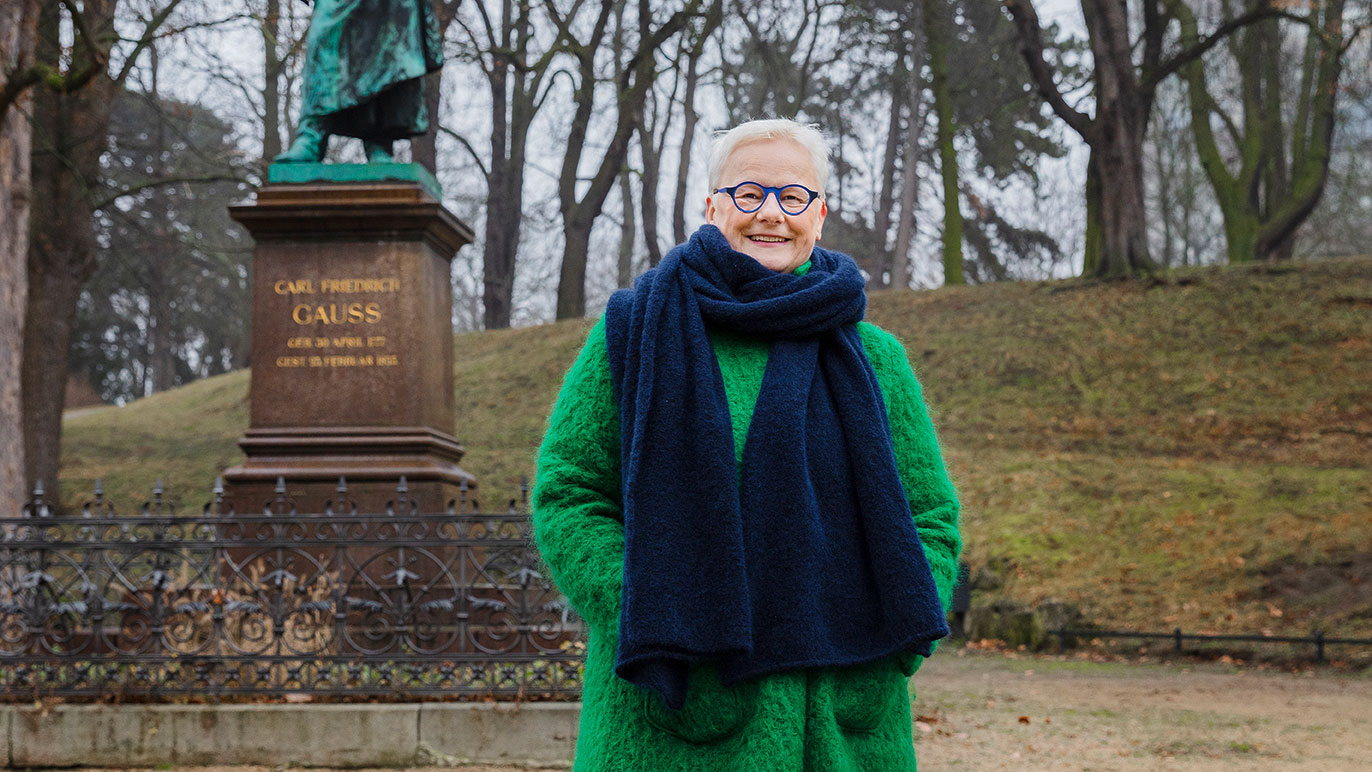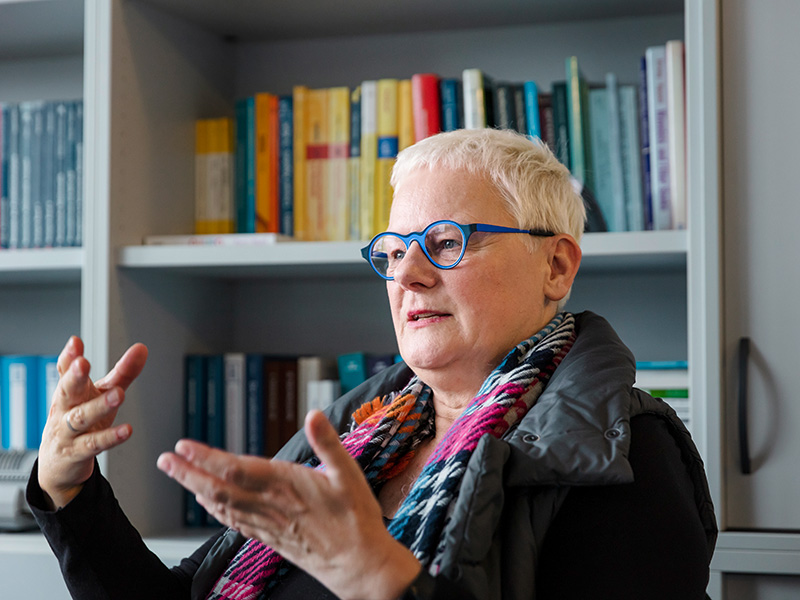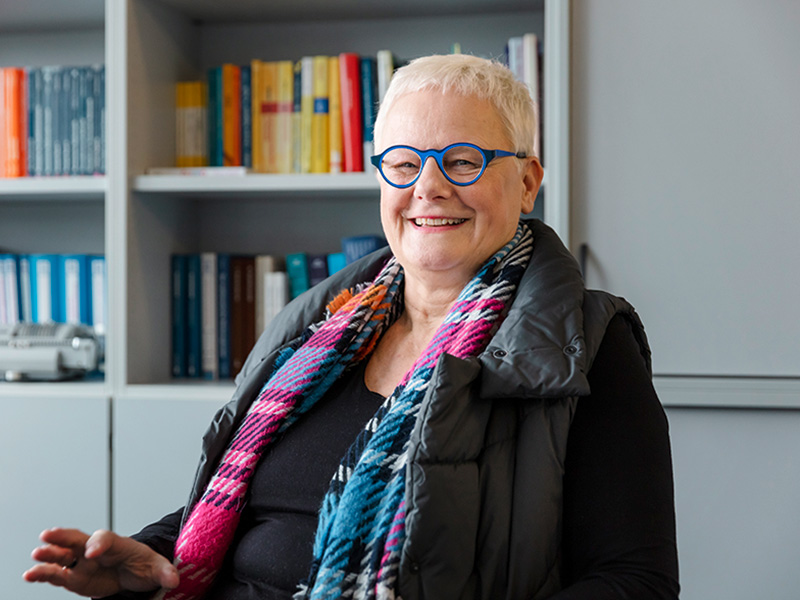
©GfG/Universität Bremen
And then? I nearly experienced a culture shock
Your degree is over, bring on your first job – or not? In the new Yearbook of the University of Bremen, graduates tell us about their lives after graduation.
Professor Heike Faßbender completed her PhD and habilitation at the University of Bremen. She was one of the first members of staff at the Center for Industrial Mathematics (ZeTeM), which was founded in 1995. Today, Faßbender is a professor at the Technische Universität Braunschweig (TU), where she is head of the Institute for Numerical Analysis.
Ms. Faßbender, your PhD supervisor took you from Bielefeld to the University of Bremen in 1991. What was the initial period here like?
I have to admit that my first impressions of my new work place were not very positive. When I went to the MZH building, I did not feel particularly welcomed by the surroundings. The building has now been refurbished but it really was not nice back then. However, as soon as I got to know the people in the building, my new math colleagues, my first impressions soon went away. I really appreciated that all the math department was located in one building. This meant that they were only a short distance away and we were able to communicate daily with each other in an uncomplicated manner.
The start of your PhD and working at the University of Bremen coincided with the time that ZeTeM was being established. How involved were you in the process?
Quite a lot. It was an exciting time, during which I learnt a lot that helped me during the rest of my career. My PhD supervisor, Angelika Bunse-Gerstner, was actively involved in the ZeTeM establishment process. But it was not just her who contributed – she also involved her entire group. I saw all job interviews for the three newly established professorships and was able to learn how you can present yourself well during an application procedure. I also experienced the discussions behind closed doors on how the center should be put together in terms of content. Looking back, this period really represents the discussion culture at the University of Bremen. I learnt to appreciate this culture, especially in comparison to later stages in my career. Every staff member was taken seriously at the University of Bremen and was able to contribute to such discussions – regardless of whether they were a PhD student or a professor.

©GfG/Universität Bremen
It sounds like your time in Bremen really shaped you. Did you have a typical last day back then or a type of farewell from the University of Bremen?
When I think back, it was more of a gradual farewell. My husband, who at the time worked in the same ZeTeM working group, stayed for longer and we continued to live in Bremen for a while. That is why I was still there regularly. I have now not been in Bremen for a long time but am still in contact with my colleagues there. I would like to go to the University of Bremen soon though.
Did you feel like changing to a different university was an upheaval?
It was nearly a culture shock when I accepted an appointment in Munich after my time in Bremen. Due to my degree in Bielefeld and the PhD and habilitation in Bremen, I was socialized at young, reform universities, where there are generally flat hierarchies. At the Technical University (TU) of Munich – as it the case with other technical universities – there are far more pronounced hierarchies. It has always been the case in Munich that C4 professors are in charge. For example, lectures there are usually only given by professors. During my time at the University of Bremen, I held lectures comprising the entire teaching portfolio in my field. I would never have been able to gain this experience in Munich. The confidence, which I was able to acquire by doing this, should not be undervalued.
You still moved from your role as professor at the TU Munich to a different TU, namely Braunschweig. What was the reason for this?
I like being at a TU because I enjoy the math that is carried out here. I do not do math just for math’s sake but rather math that has a strong applicability. In Munich I had a so-called “temporary C4” appointment. Munich is a beautiful city and the scientific system in Bavaria does have its advantages. However, I wanted to return to the North. I already had several appointment calls to decide between prior to my time in Munich being over. I chose Braunschweig. That was a good decision. I am going to stay here.

©GfG/Universität Bremen
In the course of your career, you have been able to convince many people to trust in your abilities. Amongst other things, you were a founding dean of a new faculty and vice president of the TU Braunschweig. What is your recipe for success?
Within the scientific system, I have always found the following: those who say their opinion get a job. Of course, you have to take on the responsibility and be persistent in order to successfully realize your plans. That is why I took on several aspects of Angelika Bunse-Gerstner’s leadership style. I trust in the abilities of my staff and give them responsibility early on. They can always come to me if they have questions but I just let them do their thing initially. That is an important opportunity for character development. Additionally, a good network is important. As early on as my time as a PhD student, I was given the chance to go to conferences and meet the community. That was not a matter of course. At the beginning, the whole working group had a budget of a few hundred German Mark for telephone calls, post, and travels. My great network in the community contributed to the fact that I had many chances to help makes positive changes in the university and scientific systems. It is this chance that I am giving to my staff now.
“They can always come to me if they have questions but I just let them do their thing initially.”
You are currently part of the Accreditation Council, which accredits new degree courses across Germany. You are also president of the International Association of Applied Mathematics and Mechanics (GAMM). What drives you to be active beyond your professorship?
I have always followed the impulse to change things in order to improve them. That is why I was a women’s affairs officer at the University of Bremen and do not shy away from posts with responsibility. It is great to see this effort come to fruition. As an example, during my time as vice president of the TU Braunschweig, we were persistent and thus successful in implementing that income from study fees could be used for the support of students in need. That was an amazing success.
Heike Faßbender graduated with a diploma in mathematics from the University of Bielefeld in 1989 and then completed a Master of Science in Computer Science at the State University New York at Buffalo, USA, in 1991. In 1994, she did her PhD in mathematics at the University of Bremen and then habilitated in 1999, also at the University of Bremen.